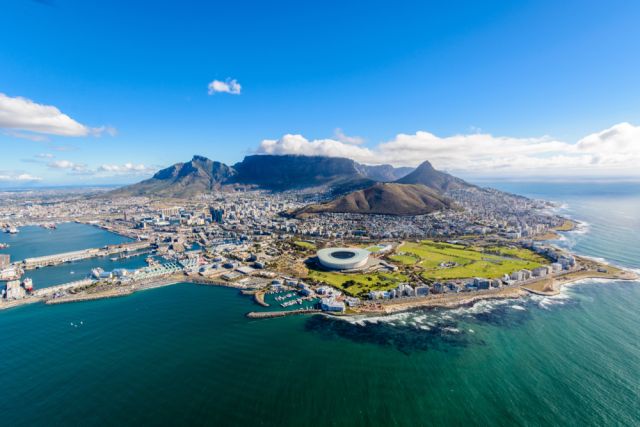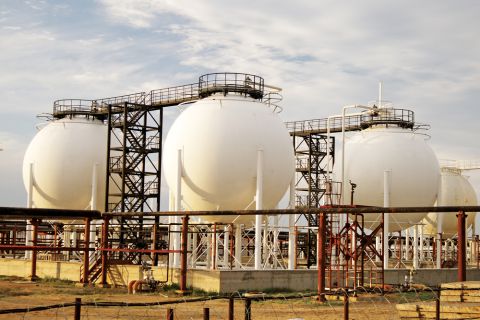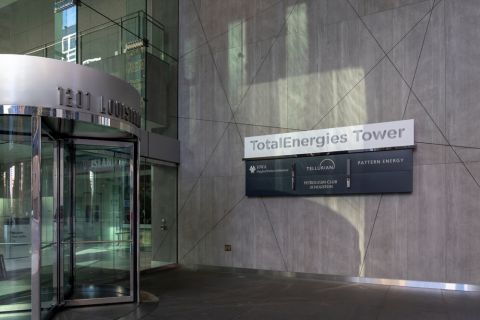
Cape Town, South Africa, is at the forefront of other major cities in its approach to deal with rolling blackouts and boost its own energy security while reducing its coal usage in favor of renewables. (Source: Shutterstock)
The continued transformation of South Africa’s economy and power demands are of strategic importance to the U.S. as North American, Chinese and Russian technologies compete for dominance in top African markets, said Mark Kennedy, director of the Wilson Center’s Wahba Institute for Strategic Competition.
Resultantly, investors, especially American ones, need to take note of what is going on in Cape Town and other African cities, Kennedy said Jan. 16 during Wilson Center’s webinar, titled “Africa’s Growing Cities: Challenges and Opportunities,” citing reasons driven by fear and the pursuit of opportunity.
“If African cities don’t become generators of opportunities for their nations, then the prospects for unrest, with their young populations, or mass migration just escalates,” Kennedy said. “Helping to support those vibrant, smart African urban areas that generate economic opportunity for Africans is really one of the biggest commercial prospects for exports in the decades ahead.”
Of special note, in that African mix is South Africa, whose economic importance on the global scale was solidified in 2010 when it joined the BRIC group, which was renamed BRICS to take into account its member countries Brazil, Russia, India, China and South Africa.
Fellow African nations Egypt and Ethiopia both joined BRICS at the beginning of 2024, along with Saudi Arabia, Iran and the United Arab Emirates.
Besides not having an upstream energy focus, Kennedy said the other [U.S.] challenge in Africa related to the fact that no American companies were in the top 20 global ranking of contractors. Kennedy said that 15 of the top 20 contractors were Chinese, three were French, one was Spanish and one was Austrian, citing a 2023 ranking from Engineering News-Record.
“We need to do a better job of either having our contractors develop global partnerships around the world or partner more frequently with the French and the Spanish and the other contractors and the European Union agencies they support,” Kennedy added.
Cape Town moves to tackle blackouts
Speaking during the webinar, Cape Town Mayor Geordin Hill-Lewis bemoaned major infrastructure challenges and socioeconomic issues, including poverty, crime, housing and, notably, energy insecurity.
Cape Town is at the forefront of other major cities in South Africa with its approach to combat rolling blackouts and boost its own energy security while reducing its coal usage in favor of renewables.
“The [blackouts] aren’t normal and they never should become normal. In fact, they have been disastrous for our economy,” Hill-Lewis said. “We simply must deal with our energy security issue. We cannot wait around for the national government to fix the [issue]. We must do so ourselves.”
Hill-Lewis said Cape Town’s population of almost 5 million could reach 10 million within another decade, and that South Africa’s blackouts, which date back to 2007, were the single biggest thing holding back its economic growth.
The primary fuel consumed in South Africa is coal, according to details in the Energy Institute’s 2023 Statistical Review of World Energy, which accounted for 69% of consumption in 2022, followed by oil (22%), natural gas (3%), renewables (3%), nuclear energy (2%) and hydro-electricity (1%).
Despite its high coal usage, Africa in general accounts for less than 3% of the world's energy-related CO₂ emissions, according to the International Energy Agency (IEA).
Plans to further reduce blackouts in Cape Town will require new investments in renewables, not fossil fuels, in a concerted effort to reduce the city’s reliance on coal energy, Hill-Lewis said.
“[Still], we’ve also made it easier for households, families and businesses to invest in renewable energies themselves, to invest in solar power. And we’re the first city in the whole African continent to buy that excess power back from families and businesses and pay them cash for it,” Hill-Lewis said.
Cape Town also allows what is called “wheeling” across its city grid. The practice allows two companies to use the city’s grid to sell power to one another with no involvement from the government in the transaction. The city benefits since the companies pay a small fee to wheel the electricity across its grid, the major said.
“We’re doing everything that we can to incentivize and help the investment in more private power generation in our city grid. We want to show the rest of the country that you do not need to accept that these failures are permanent or irreversible,” Hill-Lewis said.
Hill-Lewis added that the lingering impacts of apartheid continue to complicate matters at the state and local level.
“What makes South Africa’s urbanization challenges unique and especially difficult is the effect that apartheid legislation had on planning … in our cities,” Hill-Lewis said. “Thirty years into our democracy, the special legacy of apartheid is still evident across South Africa wherever you go in all of our cities.”
Recommended Reading
For Sale, Again: Oily Northern Midland’s HighPeak Energy
2024-03-08 - The E&P is looking to hitch a ride on heated, renewed Permian Basin M&A.
E&P Highlights: Feb. 26, 2024
2024-02-26 - Here’s a roundup of the latest E&P headlines, including interest in some projects changing hands and new contract awards.
Gibson, SOGDC to Develop Oil, Gas Facilities at Industrial Park in Malaysia
2024-02-14 - Sabah Oil & Gas Development Corp. says its collaboration with Gibson Shipbrokers will unlock energy availability for domestic and international markets.
E&P Highlights: Feb. 16, 2024
2024-02-19 - From the mobile offshore production unit arriving at the Nong Yao Field offshore Thailand to approval for the Castorone vessel to resume operations, below is a compilation of the latest headlines in the E&P space.
TotalEnergies Acquires Eagle Ford Interest, Ups Texas NatGas Production
2024-04-08 - TotalEnergies’ 20% interest in the Eagle Ford’s Dorado Field will increase its natural gas production in Texas by 50 MMcf/d in 2024.






